
8 minute read
Michael Pollan: 2019 Ruderman Lecture
A REPORT ON THE SEPTEMBER 24,2019 MORTON E. RUDERMAN MEMORIAL LECTURE:12 Western Avenue, Petaluma, CA 94952 tel: 707.773.0654 fax: 707.778.1868 www.barclayagency.com
Michael Pollan
Advertisement
Michael Pollan, What Can Psychedelics Bestselling Author & Sustainable Food Advocate For the past thirty years, Michael Pollan has been writing books and articles about the places where the human and natural worlds intersect: “Michael Pollan [is a] distinguished author and designated repository for the nation’s food conscience.” STEVEN BARCLAY AGENCY on our plates, in our farms and — New York Times Teach Us About Spirituality? Photo: Jeannette Montgomery Barron featuring gardens, and in the environment. Pollan is the author of eight books, six of which have been New York Times bestsellers; three of them (including his latest, How to Change Your Mind) were immediate #1 New York Times bestsellers. Previous books include Cooked (2013), Food Rules (2009), In Defense of Food: An Eater’s Manifesto (2008) and The Omnivore’s Dilemma: A Natural History of Four Meals (2006), which was named one of the ten best books of 2006 by both the New York Times and the Washington Post. SEBASTIAN STOCKMAN Michael Pollan Bestselling Author & Sustainable Food Advocate It also won the California Book Award, the Northern California Book Award, the James Beard Award for best food writing, and was a finalist for the National Book Critics Circle Award. A revised, young readers’ edition of Omnivore’s Dilemma was published in 2015. Pollan’s 2001 book, The Botany of Desire: A Plant’s-Eye View of the World, also a New York Times www.barclayagency.com bestseller was recognized as a best book Associate Teaching Professor, Department of English 707-773-0654 or toll free in the US 888-965-7323 of the year by the American Booksellers Association and Amazon.com. Pollan is also the author of A Place of My Own (1997) and Second Nature (1991). An expanded edition of Food Rules, with original illustrations by Maira Kalman, was published in 2011. How to Change Your Mind was named one of the New York Times’ 10 Best Books of 2018.
College of Social Sciences and Humanities
A four-hour Netflix miniseries based on Cooked premiered in February 2016. PBS presented a twohour special documentary based on The Botany of Desire in fall 2009 and a two-hour documentary based on In Defense of Food was broadcast nationally in December 2015. Pollan also appeared in the Oscar-nominated documentary Food Inc., which was partly based on The Omnivore’s Dilemma.
A contributing writer to the New York Times Magazine since 1987, Pollan’s writing has received numerous awards, including the James Beard Award for best magazine series in 2003; the John Burroughs prize (for the best natural history essay in 1997); the QPB New Vision Award (for his first book, Second
Journalist, author, and sustainable-food celebrity Michael Pollan was on campus to discuss his latest book with Ruderman Professor and Director of Jewish Studies (and Director of the Humanities Center and Professor of English) Lori Lefkovitz.
Pollan’s book, How to Change Your Mind, is a departure from his focus on food, as you can tell from the subtitle: “What the New Science of Psychedelics Teaches Us About Consciousness, Dying, Addiction, Depression, and Transcendence.” That about covers it!
Make all the “whooooa, the colors, man” jokes that you want, but once you get that out of your system, Pollan has some pretty profound points to make.
Pollan told us that he got interested in psychedelics while doing “a pretty straight piece of journalism” for The New Yorker. That piece examined the use of psilocybin (you might know them as “’shrooms”) in the treatment of patients with terminal illnesses. The results were startling. For many, psilocybin “made death seem less horrible.” As it “expanded their notions of connection,” many of the patients “had lost their fear of death completely.”
Pollan was taken with the idea of “a six-hour journey into your mind that could shift your outlook on something as profound as death.” He then went looking for the semi-underground (because technically-illegal) network of therapists who administer psychedelics as treatment. After interviewing a few therapists who were either “too crazy or too casual about it,” Pollan found one who fit, and became “a very reluctant psychonaut,” and, to judge from his remarks, a cautious convert to the therapeutic use of these substances.
In a controlled environment under the guidance of therapists (which he stressed was crucial), Pollan had some experiences that changed his “understanding of what the word ‘spiritual’ means.”
He described an “applied mysticism” that provided an experience of “the spiritual absent the supernatural,” including one in which his self “burst into little Post-it notes. I was spread out like a coat of paint, or butter, on the ground. It was almost like I had consciousness without self.”
It’s hard to traffic in metaphors like these and still be taken seriously, but Pollan, by dint of his distinguished career, has credibility to spare. While he doesn’t consider this book advocacy journalism, he does believe psychedelics should be decriminalized, if for no other reason than for the purpose of further study.
“We don’t know everything about how they work,” he said. “But we know even less about some psychotropic drugs that psychiatrists now legally prescribe.”
“Psychedelics dislodge mental habit. As we get older we come up with serviceable algorithms for dealing with the problems that life presents ... A lot of mental suffering is the result of minds that have grown too rigid.” (Did you get that? Don’t take these drugs until you’re my age.)
Professor Lefkovitz (who, fun fact, went to high school with Pollan and was his creativewriting classmate in 11th grade) and Pollan noted that “reading, movies, concerts, dance, playgoing,” and even crossword puzzles can help us get out of these ruts, too.
Not all of Pollan’s experiences were positive. There was one, with something called

5meO-DMT, that Pollan called “a category five mental hurricane.” 5meO-DMT, as the half-dozen students near me who raised their hands when Pollan asked if anyone had heard of it already knew, is the “smoked venom of the Sonoran Desert Toad.” The trip sounded terrifying: “There was no matter, there was no form, there was no space,” Pollan said. “The best thing, it only lasted 10 minutes. I felt gratitude that there was something rather than nothing.”
On the other end of the intensity spectrum, Pollan was unsure what to make of microdosing, or the practice of taking a very small daily dose. He noted that Albert Hofmann, the discoverer of LSD, microdosed and lived to be 102. But that’s anecdotal. There aren’t great studies on it, though it is a Silicon Valley fad “as something that can make you calmer and more productive.”
“It’s so of our time,” Pollan said. “That we’re taking this transcendent experience and turning it into a productivity drug.”
PROFESSOR LEFKOVITZ AND MICHAEL POLLAN

See the complete video of the event
2019 2020
DECEMBER 2, 2019
TED LANDSMARK
Turning Up the Heat: Climate Resilience and Community Engagement
The goal of the Turning Up the Heat conference was to bring together knowledgeable people from multiple disciplines, and community stakeholders, to engage in discussions and a planning charrette around how communities can be better engaged in resilience planning, and the development of green jobs training. Resilience planning linked to community engagement combines community planning, infrastructure development, health and wellness, architecture and urban policy development, youth training, place-making and art, data analysis, social psychology, law, and engineering in ways that enhance collaborative urban policy-making.
Sponsored by: The School of Public Policy and Urban Affairs, the Dukakis Center for Urban and Regional Policy, in partnership with the UMass Boston Sustainable Solutions Lab
FEBRUARY 24, 2020
EUNSONG KIM AND SOMY KIM
Multi-Ethnic Coalitions: What is Possible?
The impetus for this program comes from conversations with colleagues, classroom discussions, as well as campus events that have highlighted the ongoing racial problems we experience at Northeastern and in the city of Boston. It also stems from students who have been concerned about the case Asian-American groups have leveled against affirmative action, and the problems of the single-axis issue. This program hoped to generate (and sustain) a conversation about the historical complexities of coalition building, while also offering a portrait of some of the recent strategies suggested by scholars and activists to students, faculty and staff at Northeastern.
Sponsored by: The Department of English and Northeastern Humanities Center

Launched in Fall 2013, the Contemporary Issues in Security and Resilience Studies series is presented by the Northeastern Center for International Affairs and World Cultures, the Department of Political Science, and the Northeastern Humanities Center. The College of Social Sciences and Humanities offers an MS in Security and Resilience Studies, which explores both the policies and systems behind improving national security and societal resilience.
NORTHEASTERN UNIVERSITY’S CENTER FOR INTERNATIONAL AFFAIRS AND WORLD CULTURES, THE NORTHEASTERN HUMANITIES CENTER, AND THE DEPARTMENT OF POLITICAL SCIENCE PRESENT

SEPTEMBER 10, 2019
NOVEMBER 5, 2019 Black Wave: How Networks and Governance Renewable Transformation FALL 2018Shaped Japan’s 3/11 Disasters DANIEL ALDRICH, Professor of Political Science, Director of the Security and Resilience Program, Northeastern University for Climate Resilience JENNIE STEPHENS, Dean’s Professor of Sustainability Science & Policy, Director of the School of Public Policy and Urban Affairs, Northeastern University
NORTHEASTERN UNIVERSITYOCTOBER 15, 2019 Lessons Learned in DECEMBER 3, 2019 Can Caribbean Environmental History Teach Building Collaborative Cyber Defenses Us Anything About Resilience?
MICHAEL FIGUEROA, Independent Executive Security Advisor and former Executive Director of the Advanced Cyber Security Center
SEPTEMBER 11
Is Cyber Resilience
Possible?
REINALDO FUNES-MONZOTE, Professor of History, University of Havana; Visiting Professor in the MacMillan Center for International and Area Studies










